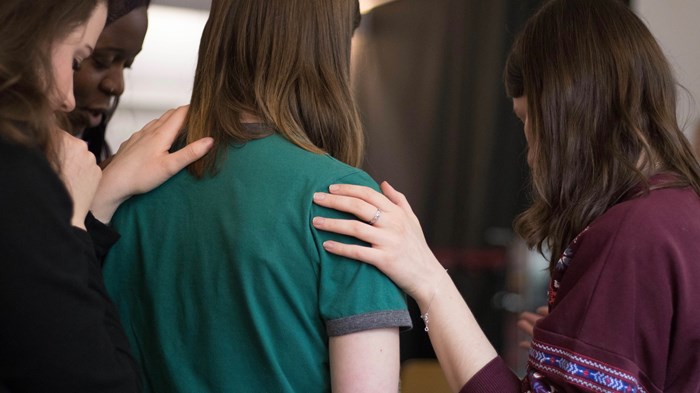Here's How to Pray with Someone Who Is Deeply Grieving

“Is anyone among you suffering? Let him pray…”(James 5:13). Unfortunately, most of us struggle with not knowing how to pray with someone who is grieving. More often than not, if you are like me, you probably feel at a loss for what to say, or about how to pray. That’s why it is important to remember that praying authentically is more important than praying articulately.
Start by praying silently for your friend or loved one. Pray silently for God’s guidance over the situation, that you’d be guided in your thoughts and actions. You can also pray that God would bring relief, hope, and healing for the other person and for all affected by the tragic event.
Be sensitive to the other person’s belief system and life experiences. This doesn’t mean you need to put your faith “on the shelf.” The goal is to have your own religious and spiritual identity help without hurting the process of forming a relationship and responding to the other person’s needs.
If it seems appropriate, without pressuring the other person, you might also ask them if they would like you to pray for them. If the person you are visiting is amenable to prayer, ask him or her if you can pray together. I’ve found most people welcome prayer regardless of where they are in their faith commitment. However, if the person declines prayer, don’t force it or push it, respect their wishes.
If they say yes, inquire if there is something specific or tangible that the person wishes to have you pray about. Even if the prayer need seems obvious, resist jumping straight into prayer, give a moment of pause so the other person has time to share other potential concerns, too.
Pray what comes naturally and from your heart. It is okay to offer a simple prayer. It’s okay if you muddle your way through your prayer. If you don’t know what to say, then say so in your prayer. It’s likely the person hurting may also feel at a loss of words. God will still listen.
Don’t be tempted to turn your prayer into some mini-sermon. Turning your eyes, and ears, and voices toward God reminds the person who may be suffering that she or he is not alone. You are with them and God is with them.
If someone is concerned about a COVID-19 diagnosis, or finances, or relationships, or anything else, it’s possible that they are having difficulty connecting with God. If so, reassure them that this isn’t uncommon. Others may be struggling with anger toward God or questioning their faith. “Forcing” prayer out loud with someone in crisis can actually add to the hurt. If the person you are there to help declines prayer, respect their wishes. You can still pray silently in that moment and beyond.
Thankfully God still hears our prayers and the heart of those who grieve regardless of how we pray or what we say.
Jamie Aten is the founder and executive director of the Humanitarian Disaster Institute and Blanchard Chair of Humanitarian and Disaster Leadership at Wheaton College. Kent Annan is director of Humanitarian and Disaster Leadership at Wheaton College, where he leads an M.A. program as part of the Humanitarian Disaster Institute.
The Better Samaritan is a part of CT's
Blog Forum. Support the work of CT.
Subscribe and get one year free.
The views of the blogger do not necessarily reflect those of Christianity Today.





















